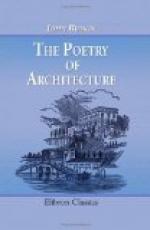117. From all this, it appears that the effect of the white villa in water is delightful. On land it is quite as important, but more doubtful. The first objection, which strikes us instantly when we imagine such a building, is the want of repose, the startling glare of effect, induced by its unsubdued tint. But this objection does not strike us when we see the building; a circumstance which was partly accounted for before, in speaking of the cottage, and which we shall presently see farther cause not to be surprised at. A more important objection is, that such whiteness destroys a great deal of venerable character, and harmonizes ill with the melancholy tones of surrounding landscape: and this requires detailed consideration.
118. Paleness of color destroys the majesty of a building; first, by hinting at a disguised and humble material; and, secondly, by taking away all appearance of age. We shall speak of the effect of the material presently; but the deprivation of apparent antiquity is dependent in a great degree on the color; and in Italy, where, as we saw before, everything ought to point to the past, is serious injury, though, for several reasons, not so fatal as might be imagined; for we do not require, in a building raised as a light summer-house, wherein to while away a few pleasure hours, the evidence of ancestral dignity, without which the chateau or palace can possess hardly any beauty. We know that it is originally built more as a plaything than as a monument; as the delight of an individual, not the possession of a race; and that the very lightness and carelessness of feeling with which such a domicile is entered and inhabited by its first builder would demand, to sympathize and keep in unison with them, not the kind of building adapted to excite the veneration of ages, but that which can most gayly minister to the amusement of hours. For all men desire to have memorials of their actions, but none of their recreations; inasmuch as we only wish that to be remembered which others will not, or cannot perform or experience; and we know that all men can enjoy recreation as much as ourselves. We wish succeeding generations to admire our energy, but not even to be aware of our lassitude; to know when we moved, but not when we rested; how we ruled, not how we condescended; and, therefore, in the case of the triumphal arch, or the hereditary palace, if we are the builders, we desire stability; if the beholders, we are offended with novelty: but in the case of the villa, the builder desires only a correspondence with his humor; the beholder, evidence of such correspondence; for he feels that the villa is most beautiful when it ministers most to pleasure; that it cannot minister to pleasure without perpetual change, so as to suit the varying ideas, and humors, and imaginations of its inhabitant, and that it cannot possess this light and variable habit with any appearance of antiquity.




